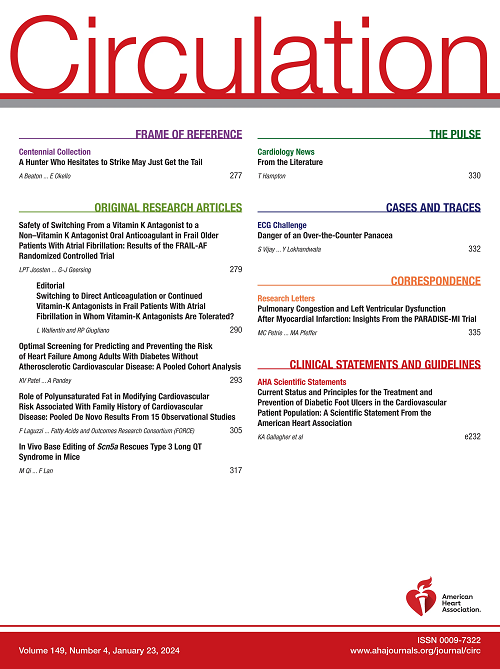心肌梗死后的心理困扰:美国心脏协会的科学声明。
IF 38.6
1区 医学
Q1 CARDIAC & CARDIOVASCULAR SYSTEMS
引用次数: 0
摘要
心理困扰在心血管疾病患者中的重要性越来越被认为是心血管疾病发展和进展的一个促成因素,也是心血管疾病发展的一个后果。急性心肌梗死患者出现抑郁、焦虑、心理社会压力或创伤后应激障碍的风险增加。综上所述,心肌梗死后出现的这些负面心理因素被称为心肌后心理困扰。多达一半的心肌梗死患者可能会经历某种形式的心理困扰,这种心肌梗死后的心理困扰与未来心脏事件的风险增加有关。心肌后心理困扰可能导致未来心脏病风险增加的生物学机制包括体力活动减少、吸烟(和戒烟失败)、过量饮酒、不良饮食、肥胖、睡眠不足、社会支持不足、药物依从性降低以及心脏康复的出席率低。关于心肌后心理困扰治疗是否能改善心脏预后的数据好坏不一,进一步的研究,特别是对焦虑、压力和创伤后应激障碍患者的研究,将会有所帮助。无论如何,多重干预可以减少心理困扰,从而改善心理健康,增强情感幸福感,提高生活质量。卫生保健专业人员的目标应该是不仅治疗疾病,而且治疗我们面前的整个人。本文章由计算机程序翻译,如有差异,请以英文原文为准。
Post-Myocardial Infarction Psychological Distress: A Scientific Statement From the American Heart Association.
The importance of psychological distress in patients with cardiovascular disease is increasingly recognized as both a contributing factor to the development and progression of cardiovascular disease and a consequence of the development of cardiovascular disease. Patients with acute myocardial infarction have increased risks for depression, anxiety, psychosocial stress, or posttraumatic stress disorder. Together, these negative psychological factors when occurring after myocardial infarction have been referred to as postmyocardial psychological distress. Up to half of patients after myocardial infarction may experience some form of psychological distress, and this postmyocardial psychological distress has been associated with an increased risk of future cardiac events. Biologically plausible mechanisms by which postmyocardial psychological distress may lead to increased future cardiac risk include lesser physical activity, smoking (and failure to stop smoking), excess alcohol consumption, poor diet, obesity, inadequate sleep, inadequate social support, decreased medication adherence, and poor attendance at cardiac rehabilitation. The data on whether treatment of postmyocardial psychological distress improves cardiac prognosis are mixed and of variable quality, and further studies, particularly in patients with anxiety, stress, and posttraumatic stress disorder, would be helpful. Regardless, multiple interventions can reduce psychological distress and thus lead to improved psychological health, a greater sense of emotional well-being, and a better quality of life. A goal of health care professionals should be to treat not only the disease but also the person as a whole in front of us.
求助全文
通过发布文献求助,成功后即可免费获取论文全文。
去求助
来源期刊

Circulation
医学-外周血管病
CiteScore
45.70
自引率
2.10%
发文量
1473
审稿时长
2 months
期刊介绍:
Circulation is a platform that publishes a diverse range of content related to cardiovascular health and disease. This includes original research manuscripts, review articles, and other contributions spanning observational studies, clinical trials, epidemiology, health services, outcomes studies, and advancements in basic and translational research. The journal serves as a vital resource for professionals and researchers in the field of cardiovascular health, providing a comprehensive platform for disseminating knowledge and fostering advancements in the understanding and management of cardiovascular issues.
 求助内容:
求助内容: 应助结果提醒方式:
应助结果提醒方式:


